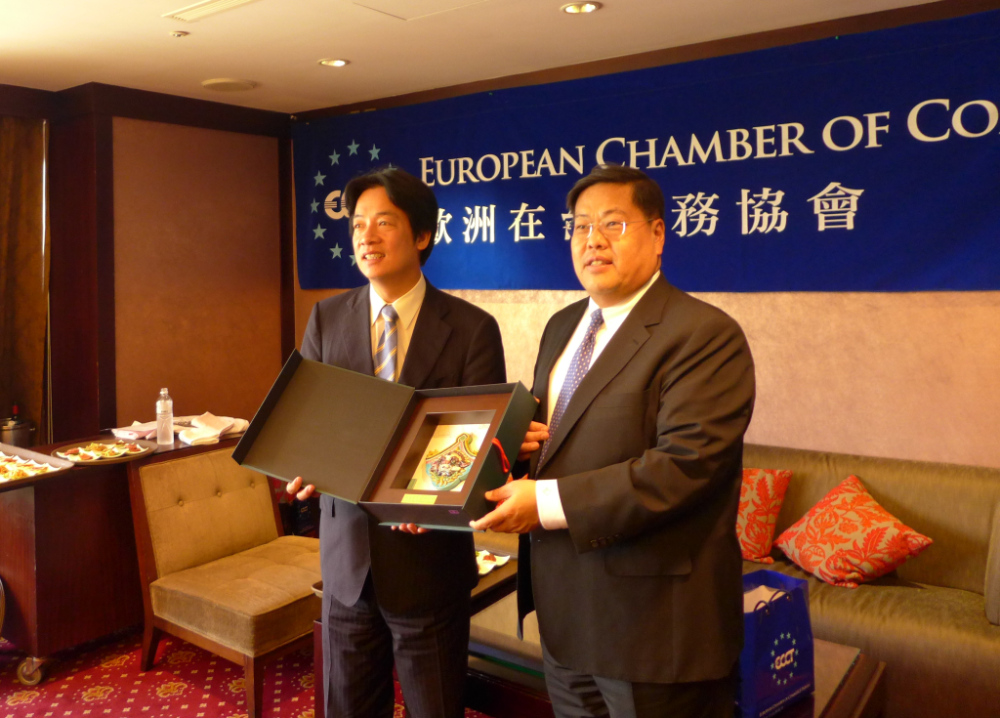Lunch with Tainan Mayor William Lai & visit to NCKU

Vice Chairman Godwin Chang began with an introduction to the ECCT. He informed the mayor that the ECCT had made the transition to a nation-wide association and that the historical visit to Tainan is part of the chamber's efforts to expand its business activities and presence across Taiwan. He told the mayor that the delegation was in Tainan today to learn about the city, the government's development plans, possible business opportunities and areas where the ECCT and the city government can cooperate in the future.In his remarks Mayor Lai welcomed the delegation and said that the city encouraged members to invest in the city, which he noted had become a much more attractive investment destination following the city's upgrade to one of Taiwan's five special municipalities in 2010. Besides efforts to improve the investment environment, the mayor said that the city is working hard to make the city a culture and tourist mecca in Southern Taiwan.The mayor's introduction was followed by a presentation by ECCT CEO Freddie Hoeglund on the ECCT's position papers and a briefing by ECCT Director Erdal Elver on the ECCT's Low Carbon Initiative (LCI). Elver informed city government officials that the ECCT set up the LCI to showcase the best European low carbon solutions and practices across a broad range of industries, to raise awareness about sustainable development and promote the adoption of low carbon solutions in order to help Taiwan to reduce its carbon emissions. Elver noted that it was encouraging to see that Mayor Lai and the Tainan city government have demonstrated a strong commitment to environmental protection and sustainable development through various green energy and transportation initiatives. Given the ECCT and the city government's shared commitment to promoting low carbon solutions, on behalf of the chamber and the LCI, Elver welcomed the opportunity for joint cooperation in the future.
Investment environment in Tainan
Over lunch, delegates were briefed by Tainan city government officials on the investment environment in Tainan. Tainan is home to Taiwan's largest agricultural and industrial area in Southern Taiwan. The city and surrounding area contain 66 industrial parks including the Tainan Science Technology Park, the Tainan Technology Industrial Park, Madou Industrial Park and Qigu Technology Park. The city has a population of 1.88 million people and an excellent infrastructure, including a link on the Taiwan High Speed Rail and a business-friendly government, abundant water resources and stable power supply. In addition, the city boasts a rich cultural heritage as the home of the first European (Dutch) settlers in Taiwan, two national scenic areas, one national park, high quality affordable housing and an abundance of land for development. To cater to tourists, there are 212 hotels and 63 B&Bs in the city. Tainan has been rated as a 3-star city by the Michelin Green Guide. The city also boasts a highly skilled and educated workforce, a complete financial support system for business. To make it easier to invest in the city, the city government offers a single-window investment service staffed by specialists to assist investors in land acquisition matters, setting up factories, business registration, labour and environmental regulations among other issues.
The city government is committed to sustainability and reducing carbon emissions. The city has initiated 10 low carbon projects in the city including promoting the installation of solar panels in the city's buildings, factories and farms, saving energy, greening buildings and recycling. In addition, the city government is planning to launch a pilot electric bus project in the city by the end of 2013.
Visit to National Cheng Kung University (NCKU)
The ECCT delegation briefed the NCKU delegation about the ECCT's LCI and were given presentations about NCKU, with a focus on the university's green energy and environmental research activities. After the presentations, the ECCT delegation was given a tour of NCKU's "Magic School of Green Technologies", one of the greenest buildings in Taiwan, certified as LEED Platinum.
NCKU was established in 1931, originally as a technical college. It has since evolved into one of Taiwan's most prestigious and top-ranked universities, particularly in the engineering and science fields. The university has nine colleges (all located on the same campus), 41 departments, 36 institutes, 77 master's programmes and 54 doctoral programmes. NCKU is committed to pursuing interdisciplinary research. A case in point is NCKU's Research Center for Energy Technology and Strategy (RCETS), which combines researchers and resources from multiple disciplines including mechanical engineering, urban planning and electrical engineering to conduct research into energy solutions. RCETS has organized 32 research groups on fields including solar cells, smart grids, LED lighting, fuel cells, hydrogen systems, wind power and biomass. Besides conducting research, RCETS holds conferences and seminars on energy-related topics and takes part in government-funded energy projects.
